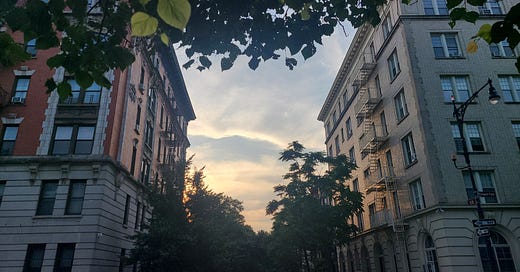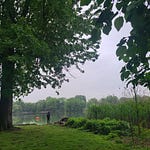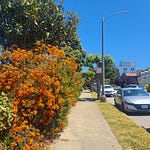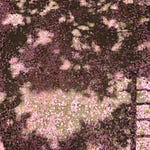I had a dream that my parents showed up at my door a few days or a week before I expected them. In my dream, I opened the door and there they were, unencumbered by any luggage. That was the first sign that it was a dream — no one carried anything.
It’s hard to describe how I felt when I saw them — joy, euphoria, gratitude, I don’t know, that kind of thing, but none of those feel magical like I did. It felt more like I had just been told that I was made of light and air, and furthermore, we all were. We are all weightless perfect beings, floating like pollen or stardust or like those turtles in the moving tunnel of water in Finding Nemo. That’s what it felt like to open the door and see them.
In my dream, I kept checking for signs that this was really happening. I asked my wife, is this real? And she said, yes. I asked my brother, are they really here? And he said, yes. We were all so happy to see each other. In the dream, I checked their locations on my phone, and saw, yes, they are in New York, they are right next to me.
Most of what I did in the dream was pursue proof of reality. The evidence I found was insufficient. No matter how many times I locked eyes with my mother, no matter how many times my dad grinned at me, I had this quiet conviction that this wasn’t real. Some deep, prehistoric part of me knew that this was a dream, and that if I looked at my real phone and checked my parents’ locations, I’d see that they were in California.
But in the dream I felt so warm and light; we all did. So I kept dreaming. We went on some blurry adventures of shapes and colors. We exited an elevator and stood in a lobby. We walked. It was daytime or nighttime. My parents smiled. I saw their teeth. We all looked at each other like, we are here!
When I woke up, I knew where my parents were. I looked around this bedroom in Brooklyn, the one Jess and I have made our home. I looked at the marigold curtains that used to be the runners at our wedding. I got out of bed.
Something happened to me recently, and the only way I can describe it is that art and I have just admitted to each other that we’re in love. This comes after years and years of yearning, flirting, touching knees, glancing across the room, and guessing at intentions. We had a will-they-won’t-they thing for decades. Sometimes I would treat her like the most important force in the world and other times I’d ignore her. Honestly her friends probably don’t like me and I wouldn’t blame them.
Now that we’ve confessed our love, art and I cannot get enough of each other. I’m always thinking about her. If I’m not with her, I’m thinking about when I will be next. When we are together, we build worlds and time doesn’t exist.
I feel like a different person than I was before we defined the relationship. I wonder: have I fallen too hard? am I descending into lunacy? am I being selfish? am I wasting my one precious life?
It’s disorienting and destabilizing to commit to art-making after years of keeping her close but not too close. It feels dreamlike. It feels like, I can just choose to treat art as though it is essential? I can just admit to myself that I love her?
So rather than searching for evidence that this dream is real, I find myself looking for evidence that this dream is a dream. I want proof that I am delusional. I want proof that I should go back to the version of me that kept art-making at a distance.
But I am not finding it. On the contrary, I keep seeing signs that I must continue to hold art close, foster our relationship, and see what we can make together, for ourselves and for others. Probably I am seeing these signs because I want to. Absolutely. But nonetheless, I see them — in books people leave on their stoops, in trees, in words people put on signs. I see them when I think about the pieces of art that have changed my life in tangible, measurable ways.
So I am dreaming and I am awake.
This feeling has led me to believe that these states of being are not necessarily a binary, but a braid. Cleaving wholly to reality or unreality cultivates cynicism or detachment, respectively. Neither of these encapsulates the full spectrum of what it feels like to be alive: reality, alone, erases the sublime, while unreality, alone, erases the connectivity.
But if we view reality and unreality as parts of a whole, we create space to experience the sublime without disengaging. We have room for the terror, the beauty, the joy, the hopelessness, all of it. We see what is, and we braid it with what could be.
It’s hard to imagine weaving reality and unreality together until it’s happening. And then when it does, I find the definitions shifting again. Because I think weaving this braid, entwining the sublime and the disgusting, the intangible and the tangible, embracing that neither is actually more real than the other — I think this is what it means to be truly, actually, awake.













Share this post